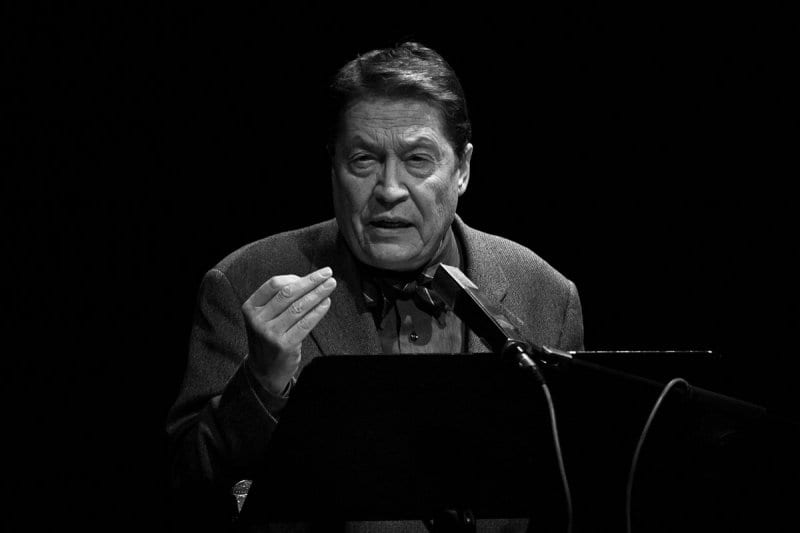
Luigi Ballerini
A Word is Worth a Thousand Photos
AAIS AATI @ University of Arizona – 2020
Luigi Ballerini – Biografia
Award winning poet, essayist, translator and curator, Luigi Ballerini lives in New York and Milano and has taught modern and contemporary Italian Literature at the University of California (Los Angeles). His books of poetry include eccetera. E(Guanda, 1972), Che figurato muore (Scheiwiller, 1988), Che oror l’orient (Lubrina, 1991) Il terzo gode (Marsilio, 1994), Shakespeherian Rags (Edizioni di Quasar, 1996), Uno monta la luna (Manni, 2001), Cefalonia (Mondadori 2005), Se il tempo è matto (Mondadori 2010), Una dozzina di scherzi +3 (Montanari, 2012), and Apelle figlio d’apollo (Cento Amici del Libro, 2016). In 2015 Beppe Cavatorta edited for Mondadori Luigi Ballerini. Poesie 1972-2015 a comprehensive collection of his poetry. His anthologies of American and Italian poetry include La rosa disabitata (Feltrinelli, 1981), Shearsmen of Sorts (Forum Italicum 1992), The Promised Land (Sun & Moon, 1999), Nuova Poesia Americana: Los Angeles (Mondadori, 2005), Nuova Poesia Americana: San Francisco(Mondadori, 2006), Nuova Poesia Americana: New York (Mondadori, 2009), Nuova Poesia Americana: Los Angeles (Mondadori, 2005), Nuova Poesia Americana: San Francisco (Mondadori, 2006), Nuova Poesia Americana: New York (Mondadori, 2009), Those Who From Afar Look Like Flies (University of Toronto Press 2017), and Nuova Poesia Americana: Chicago e le praterie (Nino Acampora Editore, 2019).
He has translated into Italian several books by American authors including Herman Melville, Henry James, William Carlos Williams, James Baldwin, and Kurt Vonegut. His selection of Gertrude Stein’s poetry, La sacra Emilia e altre poesie, was published by Marsilio (Venice) in 1999. Ballerini has written extensively on avant-garde literature (La piramide capovolta, Marsilio 1975), Guido Cavalcanti, on contemporary Italian poetry (4 per Pagliarani, Scritture 2007), and on gastronomy: his edition of Pellegrino Artusi’s Science in the Kitchen and the Art of Eating Well inaugurated the Lorenzo da Ponte Itaslian Library in 2003, while his edition of Maestro Martino: The Book of the Culinary Art, was published by the University of California Press, in 2004.
He contributed to Gastronomica and the Italian TV Program Il gambero rosso, and he is the general editor of Cum grano salis a series of books dedicated to historical gastronomy published in Milan by Guido Tommasi Editore.His edition of F.T. Marinetti’s Gli indomabili has been issued by Mondadori in the year 2000, followed in the Spring of 2003 by that of Mafarka il futurista.
He has curated exhibitions of Contemporary Italian Art including Italian Visual Writing, (New York, Finch Museum and Torino, Galleria civica d’arte moderna, 1973) and Spelt from Sybil’s Leaves (Sydney, Power Gallery, 1984). He has also convened a number of conferences: The Disappearing Pheasant I (New York, NYU, 1991) and The Disappearing Pheasant II (Los Angeles, UCLA, 1994).
A number of his publication have been realized in cooperation with Artists. Among them: La parte allegra del pesce (with Paolo Icaro, Telai del Bernini 1984), Leggenda di Paolo Icaro (Essegi, 1985), La torre dei filosofi (with Eliseo Mattiacci and Remo Bodei, Essegi, 1986), Selvaggina (with Angelo Savelli, Scheiwiller, 1988), Una più del diavolo (with Marco Gastini, Noire 1994), Navi di terra e di mare (with Marco Gastini, Montanari, 1999), Vademecum per il Carro solare di Eliseo Mattiacci (Mazzottta 2004), and Le macchine inadempienti di Lawrence Fane (Mazzotta, 2006). He is the publisher of Agincourt Books.
Ballerini has received several awards for his poetry, including: the Feronia Prize for Poetry for Che oror l’orient, the Premio Brancati for Cefalonia (2000), and most recently the Lifetime Achievement Award by the Premio Tassoni jury (2018).
Abstract
From language for poetry to poetry for language. According to a humorous statement by
Giacomo Leopardi, everything since Homer’s time it has gotten better … except poetry. A
few decades later, this type of negative instigation would become the platform for the
invention of a radically new form of writing, in verse and otherwise. In his Lettre du
Voyant (1871) Arthur Rimbaud calls the new modality Objective (as opposed to Subjective)
Poetry. Ever since poets have been searching for special and unique ways to fulfill the
individual need of expression and the social function of communication that are inherent
in all speech actions. Through an analysis of various poetic compositions by Stephane
Mallarmé, Ezra Pound, Wallace Stevens, Giuseppe Ungaretti, and Elio Pagliarani, the
relevance of poetry will be illustrated and reaffirmed.